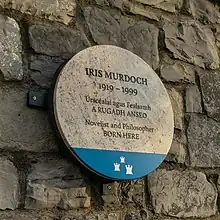| Iris Murdoch | |||||
|---|---|---|---|---|---|
| Persona informo | |||||
| Jean Iris Murdoch | |||||
| Naskiĝo | 15-an de julio 1919 en Dublino | ||||
| Morto | 8-an de februaro 1999 (79-jaraĝa) en Oksfordo, | ||||
| Mortis pro | naturaj kialoj vd | ||||
| Mortis per | Alzheimer-malsano vd | ||||
| Lingvoj | angla vd | ||||
| Ŝtataneco | Irlando • Unuiĝinta Reĝlando (Britio) vd | ||||
| Alma mater | Badminton School • Somerville College • Kolegio Newnham • Ibstock Place School vd | ||||
Memorigilo  | |||||
| Familio | |||||
| Edz(in)o | John Bayley vd | ||||
| Profesio | |||||
| Okupo | poeto • filozofo • romanisto • prozisto • biografo • profesoro • verkisto vd | ||||
| Aktiva dum | 1953– vd | ||||
| Verkado | |||||
| Verkoj | The Bell ❦ The Sovereignty of Good ❦ Sartre: Romantic Rationalist ❦ The Sea, the Sea vd | ||||
| |||||
| |||||
| vd | Fonto: Vikidatumoj | ||||
Jean Iris MURDOCH (naskiĝis la 15-an de julio 1919, mortis la 8-an de februaro 1999) estis brita verkistino kaj filozofino.
Ŝi naskiĝis en Dublin, Irlando. En Somerville College (Universitato de Oksfordo) kaj Universitato de Kembriĝo ŝi studis klasikan kaj antikvan historion, kaj filozofion. Post filozofiaj eseoj ŝi en la jaro 1954 verkis sian unuan romanon: Under The Net. Sekvis 25 pliaj romanoj, krome dramoj, liriko kaj filozofiaj publikaĵoj.
En 1956 ŝi en Oksfordo ekkonis sian futuran edzon John Bayley, kiu estis profesoro pri angla literaturo kaj ankaŭ verkis. Ankaŭ la verkisto Michael Oakeshott estis ŝia amanto.[1]
Ŝia kariero prosperis: En la jaro 1978 ŝi pro The Sea, the Sea gajnis la Premion Booker, en 1987 ŝi akiris la titolon Dame Commander de la brita kavalira ordeno Order of the British Empire.
En 1995 ĉe ŝi montriĝis la unuaj simptomoj de Alchajmero. En 1999 ŝi mortis.
La vivo de Iris Murdoch inspiris la britan verkiston A. N. Wilson al biografio. Ŝia edzo John Bayley verkis siajn memorojn pri la vivo de la verkistino en la tempo de la malsano.
En la jaro 2001 ŝia vivo estis filmigita: Judi Dench transprenis la rolon de la maljuna Iris Murdoch kaj Kate Winslet prezentis ŝin kiel junulinon en la filmo Iris.
Esperanto
Marjorie Boulton estis unu el la dumvivaj amikoj de Iris Murdoch[2]. Iris Murdoch lernis almenaŭ la bazon de Esperanto sekve de tiu amikeco[3]. En letero al Marjorie Boulton ŝi skribis en 1990, ke la Esperanto-mondo estas grandioza afero kaj ke ĝi ŝajnas estis kvazaŭ familio, feliĉa familio.[4]. En plia letero al Boulton en 1995 ŝi esprimas, ke ŝi sentas, ke estas certa magio en Esperanto kaj ke ĝi apartenas al la tuta mondo[5].
En sia libro "A Word Child" (1975) Murdoch enmetis dialogon, kiu rilatas al la formo -ino en Esperanto, en la vorto patrino, erare tradukita per "malgranda patro". [6] La dialogo estas citita de David Crystal kaj Hilary Crystal en libro kun prilingvaj citaĵoj[7].
Verkoj
Romanoj
- Under the Net (1954)
- The Flight from the Enchanter (1956)
- The Sandcastle (1957)
- The Bell (1958)
- A Severed Head (1961)
- An Unofficial Rose (1962)
- The Unicorn (1963)
- The Italian Girl (1964)
- The Red and the Green (1965)
- The Time of the Angels (1966)
- The Nice and the Good (1968)
- Bruno's Dream (1969)
- A Fairly Honourable Defeat (1970)
- An Accidental Man (1971)
- The Black Prince (1973)
- The Sacred and Profane Love Machine (1974)
- A Word Child (1975)
- Henry and Cato (1976)
- The Sea, the Sea (1978)
- Nuns and Soldiers (1980)
- The Philosopher's Pupil (1983)
- The Good Apprentice (1985)
- The Book and the Brotherhood (1987)
- The Message to the Planet (1989)
- The Green Knight (1993)
- Jackson's Dilemma (1995)
- Something Special (mallonga noveldono 1999; originalo 1957)
Filozofiaj verkoj
- Sartre: Romantic Rationalist (1953)
- The Sovereignty of Good (1970)
- The Fire and the Sun (1977)
- Acastos: Two Platonic Dialogues (1986)
- Metaphysics as a Guide to Morals (1992)
- Existentialists and Mystics (1997)
Teatraĵoj
- A Severed Head (1964)
- The Italian Girl (1969)
- The Three Arrows & The Servants and the Snow (1973)
- The Black Prince (1987)
Liriko
- A Year of Birds (1978; prilaborita eldono 1984)
- Poems by Iris Murdoch (1997)
Referencoj
- ↑ Paul Franco, Michael Oakeshott: An Introduction, pp. 22
- ↑ "Marjorie Boulton was one of the lifelong friends", frazo pri ilia rilato en: Iris Murdoch. Living on Paper: Letters from Iris Murdoch 1934-1995
- ↑ "Murdoch was intrigued by Esperanto and learnt it well enough to be able to discuss its merits and failings with her friend, although it slipped from her mind as she grew older." Sama libro
- ↑ "The Esperanto world is a great thing, you are one of its great pillars. It must be rather like a family too, a happy family." En letero al Marjorie Boulton, decembro 1990. Sama libro
- ↑ "I feel there is some magic in Esperanto, it belongs to the whole world." En letero al Marorie Boulton, 29-a de julio 1995. Sama libro
- ↑ La dialogo finiĝas per "'The Esperanto for "mother" is patrino.' 'Down with Esperanto!' said Laura." Iris Murdoch. A Word Child, p. 97 - 98.
- ↑ David Crystal, Hilary Crystal. Words on Words: Quotations about Language and Languages, p. 68, kun tajperaro ('patrono', ne 'patrino')